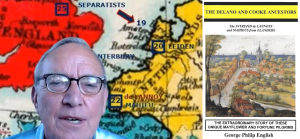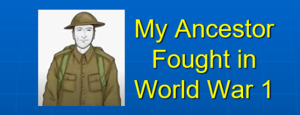BACK TO THE FAMILY FUTURE continues with Joseph Lough, Eliza Dobson, Edward Dobson and Lucy Lough bringing the ancestors to life.
Act 3: 1856
The sound quality in the video is poor so it is suggested that you watch the video along with this blog script.
Eliza Dobson
talks about the historic events that have happened in her lifetime, including the French Revolution, Ireland joining the United Kingdom, the world’s first steam locomotive; abolition of the slave trade, the Battles of Trafalgar and Waterloo and 3 Monarchs. By 1856, Mary Ann & Edward have emigrated to Christchurch in New Zealand with their children and Edward’s brother, Alfred.
Edward Dobson talks about their early days out there; and the challenges of his job as Provincial Engineer for the fledgling Canterbury province. Joseph Lough (in Shoreditch) talks about his son Alfred‘s marriage; and his other son Edwin also emigrating to New Zealand. The twins Lucy & Alice have just had their 18th birthday. Joseph receives a letter from Alfred Dobson in New Zealand.
Joseph Lough
receives Alfred Dobson’s proposal letter from NZ. Joseph reads ‘marriage!’ Then says to Lucy “Come here. I want you to take this letter and read it and let me know what your decision is.”
Lucy (in Shoreditch, London)

Is given Alfred’s letter by her father Joseph on 18th birthday
Well it wasn’t a surprise exactly – Alfred and I had become very close and he had spent many hours with Alice and I as we grew up. I had no hesitation in accepting his proposal and expressed my wish to father to travel to NZ so we could be married as soon as possible.
I was very excited to be making the voyage to NZ to marry dear Alfred and to be able to take care of him as he was not a robust man.
We left on the 10th Sept 1856. Our ship was the Egmont which was a fairly speedy vessel. The voyage took us approximately 3 months. I was lucky to have pleasant accommodation and being only 18 at the time, Father had arranged for me to travel in the care of Bishop Harper who was making the journey with his wife and family. He was to become the first Bishop of Christchurch.
The voyage was of course not uneventful with many succumbing to sea sickness and other illnesses. My nursing skills came in very handy and I was able to assist those who were unwell. I also became ill at one point and was confined to my cabin. Due to the illness I did become much more like my darling sister Alice – being thin and pale, and as people told me, looking quite delicate.
Act 4: January 1873
Eliza Dobson (in Upper Holloway, Middlesex)

After the Maori and British signed the Treaty of Waitangi, NZ became an attractive place to settle. Surveyors and engineers were in high demand and my sons Edward and Alfred had the skills and courage to embark on a new stage in their lives in NZ.
Shaping the land from the ground up, engineers and surveyors such as my sons facilitated the building of that young country’s towns and cities, connecting them with road and rail networks, communications systems and other essential services.
My dear sons Charles, Edward, Alfred and John (whom we lost in Tasmania through drowning at 15) settled in NZ and Australia.
The rugged terrain of New Zealand challenged our pioneering men and women. The women in particular confronted a formidable track crossing the treacherous steep hills between Lyttleton and Christchurch. They negotiated these muddy, densely forested hills whilst wearing long skirts and in some cases coping with young children. They were resilient.
In 1850 Edward, became a founding father of Christchurch, when he took my grandsons Arthur and George with him on The Cressy in the First Fleet to NZ. (The young boys spent 3 years with their Uncle Charles in Tasmania and later with Alfred in Blenheim). Edward was appointed Canterbury Provincial Engineer. He later helped establish the Engineering School of the Canterbury College, which became the University of Canterbury, (he was to lecture until 1892).
Alfred migrated to NZ in 1851 where his fortunes changed and he became a well-known surveyor and civil engineer. He became chief surveyor and provincial engineer of Marlborough.
Charles (Rev.) like Mary Ellen embraced a religious life-I think they are more like me. Charles braved the raw environment of Tasmania and helped establish the Church at Buckland and was the Vicar of that same church.
Of those who remained in England, my own dear Mary Ellen became a Sister of Mercy nun and teacher and a governess; Collet and his Scottish wife Jane Sloan chose to remain in England where Collet was much involved in theatre and music performances. My love for music and dance is expressed through his creativity and passion. Sophia has remained with me and we are very close. Outspoken like her father dearest Sophia whilst enduring terrible pain with her deformed spine has been courageous in her own right as a published writer and campaigning boldly for Women’s Rights along with her feminist friend Frances Cobbe.
Even though my children were separated by continents, they nevertheless remained in close contact with each other exchanging letters often.
Edward Dobson (in Melbourne, Australia)

Engineering work in NZ slowed down towards the end of the 60s and in 1869 I accepted a position as Engineer with the Melbourne and Hobson’s Bay United railway and then in 1871 I accepted another position with the Victorian Government Water Supply Department and I am still employed by them. Rapid growth of Melbourne occurred in the 60s and new water supply sources needed to be found and developed.
Our family is growing up and have all become quite successful in their own fields. We are so proud of them. Already we have 15 grandchildren which are a great delight to us.
Arthur has become quite famous as a result of his discovery of the pass over the Southern Alps which now bears his name. However the tragic murder of my eldest son George in 1866 continually haunts me and I am sure it will remain with me until my own death. George, an engineer and surveyor was carrying his theodolite under his coat when a gang of three criminals recently released from jail in Australia mistook him for a gold buyer carrying a bag of gold. They realised their mistake but bludgeoned him to death with a rifle butt and buried his body to prevent him from reporting them to the police. The body was located about 3 weeks later when one of the gang responded to a notice offering a reward for information relating to George’s whereabouts.
The project from which I have gained the greatest satisfaction is undoubtedly the Lyttelton Rail Tunnel. I was given the challenge of overseeing the work which commenced in 1861 amid a great fanfare. However, the rock proved to be harder than expected and seepage water flooded the workings. The contractor requested more money but his claim was rejected and a second contractor was appointed. In conjunction with my son-in-law, geologist Julius von Haast, we worked out a plan to drain the workings and a second contractor was appointed. In May 1867 I was ecstatic when we broke through with perfect alignment.
Lucy Dobson (in Blenheim, New Zealand)

On arrival in NZ I was met by dear Alfred who had the alarming news that he had lost his position as engineer with the provincial government. Although I pleaded with her, Mary Ann would not hear of a marriage until Papa had been informed. This took a very long time as you may imagine in the 1850’s with letters making their way to and fro by sea.
In the meanwhile I lived with Mary Ann and Edward at Sumner and made myself useful there. During this time Alfred gained new employment as engineer to the Nelson Provincial Council and so when the long awaited letter from Papa arrived wedding preparations began immediately.
We were married on my 20th birthday, the 22nd February 1858 at the church in Sumner. We made our first home in Nelson which we travelled to by boat on the 28th February from Lyttleton Harbour.
In about 1860 Alfred resigned his Nelson position and took up a new position as surveyor in Marlborough. So we moved to Wairau travelling overland by bullock wagon. In time Alfred laid out the town of Blenheim for the owners of the land Messrs Seymour and Fell. He also surveyed the route of the Picton-Blenheim railway and laid out the town of Nelson. In commemoration of the safe ascent of a high spur up from the Waitohi Valley, the peak was named Mt Dobson in his honour.
Our first son–Frank Barker Dobson- was born in 1861 in one of the first 2 wooden houses built in Picton. Picton was the first capital of Marlborough. Alfred and I now have five healthy children, aged 2-11. I was kept very busy in the district on account of my nursing skills and in 1860 when the diphtheria epidemic struck I was able to help a great many people. It was said that as a nurse I was capable and efficient, and also importantly, people appreciated my gentle, sympathetic and kind manner. We really had to stick together back then, and neighbours were people you could rely on.
My dear Alfred is such a kind, trustworthy and generous man, his professional ability is highly regarded. It is not easy being so far from home. I miss my twin sister Alice very much. This is harder knowing of the difficulties she faced with her children’s illnesses. I would have been able to support her with my nursing skills. Her letters from home are a great comfort to me and of course Mama and Alfred wrote often.
Joseph Lough (in Walthamstow, Essex)
In 1871, my darling wife Mary Ann died – she was so kind, loving and devoted. As well as being church warden here St Leonard’s, I’ve filled every parochial office in the Parish, trying to do my bit to help society. We had some years in the late 1850s, Alice Lough married William Sheppard in 1857 here at St Leonard’s.
Joseph concludes by reflecting back over the years and talking about his children. He has re-married Teresa Woodlock and moved out to live in Walthamstow. He has 36 grandchildren but has never seen 13 of them.

Research Through People can help you arrange your own Family Reunion, including finding family locations, making presentations and writing scripts. You can get in touch via our Contact page, or you can email info@researchthroughpeople.com.




